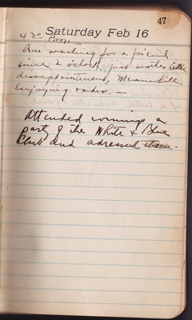
Same as yesterday
but in evening visited
Blue & White club, gave
them a talk about joining
the first district of the Zionist
Org.
————-
Matt’s Notes
The “Blue and White club” mentioned here is presumably related to the Blau-Weiss Jewish youth movement started in Germany in 1912. Blau-Weiss took its cues from the German Wanderklubs, or hiking organizations, that promoted physical fitness through outdoor activity and, not surprisingly, became inaccessible to Jews in the early 20th Century. (Here’s a 1924 photo of a Blau-Weiss outing.)
Blau-Weiss had a strong political agenda, focused specifically on the Zionist goal of physically preparing Jewish youth for the rigors of settling in Palestine. This relates to a broader movement among diaspora Jews to dispense with the image of the Jew as physically maladroit (perpetuated by anti-Semites and Jews alike) and replace it with a Jewish identity rooted in competence and toughness. These “muscle Jews,” reminiscent of the Maccabean warriors of centuries past, would hardily sow crops (and new Jews) in Palestine thanks to their discipline, tirelessness and virility.1
This thinking manifests itself in a number of organizations, including the Hakoa Vienna (hakoa means “The Strength”) an all-Jewish athletic organization that fielded Austria’s national championship soccer team in 1924 and sponsored a successful womens’ swim team in the 30’s. (I mention Hakoa Vienna because its swim team was the subject of a 2004 documentary called “Watermarks“, which is now on my Netflix queue). As I’ve mentioned before, Papa was peaceful and learned himself, but he must have been more than a little partial toward the image of the “muscle Jew” or he wouldn’t have fought to nickname his B’nai Zion chapter “The Maccabeans.”
So, now that I’ve gone on that tangent, I have to wonder if the Blue and White club Papa visited really was related to the Blau-Weiss movement. It’s certainly possible; even though Blau-Weiss’s goal was to get Jews from Germany to kibbutzes in Palestine, I’m sure some members found their way to the heavily German Lower East Side and formed a chapter there. Still, blue and white are the colors of the Israeli flag and were always associated with Zionist regalia, so maybe New York’s Blue and White club just named itself accordingly (if you’ know anything more about this, please drop a comment).
In any event, Papa visited them as part of his ongoing efforts to keep the Zionist Organization of America’s flagging first district (or chapter) afloat, which he’s already put a lot of effort into this year. I have to wonder again what it was like when he “gave a talk.” Was there a Blue and White clubhouse? Did they meet in a restaurant or coffee house? Maybe they met in a gymnasium if they were really an offshoot of Blau-Weiss. Did he lean on the edge of a desk, stand at a podium, or sit with everyone in a circle? And what did he speak? German? Yiddish ? English?
—————
References for this post
1- Pressner, Todd Samuel. “Clear Heads, Solid Stomachs, and Hard Muscles”: Max Nordau and the Aesthetics of Jewish Regeneration,” Modernism/Modernity, Vol. 10 No. 2, 2003.
Wikipeida’s entries on the Israeli flag and the role of the color blue in Judaism
